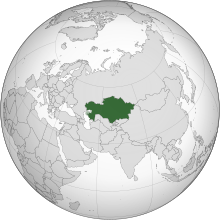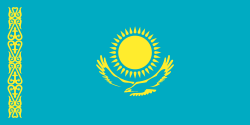The history of the Jews in Kazakhstan connects back to the history of Bukharan and Juhuro Mountain Jews. Kazakh Jews have a long history. At present, there are several thousand Jews in Kazakhstan.


Jewish history in Kazakhstan
editGeneral Secretary Joseph Stalin evacuated thousands of Jews from other parts of the Soviet Union to the Kazakh SSR. During the Holocaust 8,218 Jews were evacuated to Kazakhstan between August 1941 and January 1942.[2][3]
A Chabad-Lubavitch synagogue in Almaty is named after Rabbi Levi Yitzchak Schneerson, father of the Rebbe, who is buried at the city's cemetery, close to the synagogue. Levi Yitzchak Schneerson was exiled to Kazakhstan from Ukraine, Dnepropetrovsk, where he was a chief rabbi.[4] Lubavitcher Jews from all over the world come to pray at his grave.[5]
Yeshaya E. Cohen, the Chief Rabbi of Kazakhstan, and leader of the Alliance of Rabbis in Islamic States told Kazinform on January 16, 2004 that a new synagogue would be built in Astana. He thanked President Nazarbayev for "paying so much attention to distinguishing between those who truly believe and those who want to hijack their religion."[6] President of the Euro-Asian Jewish Congress, presented Nazarbayev with a menorah on 7 September 2004.[7]
Historical demographics
editKazakhstan's Jewish population rapidly increased between 1926 and 1959, being almost eight times larger in 1959 than in 1926. Kazakhstan's Jewish population slowly declined between 1959 and 1989, followed by a much larger decline after the fall of Communism between 1989 and 2002 due to massive Jewish emigration, mostly to Israel.[8]
| Year | Pop. | ±% |
|---|---|---|
| 1926 | 3,548 | — |
| 1939 | 19,240 | +442.3% |
| 1959 | 28,085 | +46.0% |
| 1970 | 27,676 | −1.5% |
| 1979 | 23,601 | −14.7% |
| 1989 | 20,104 | −14.8% |
| 1999 | 6,823 | −66.1% |
| 2009 | 3,578 | −47.6% |
| Source: [a] | ||
Jewish Kazakh fencer Yakov Rylsky (1928–1999) was a Soviet Olympic and world champion sabre fencer.
Jewish life today
editAbout 2,000 Jewish Kazakhs are Bukharan and Juhuro Mountain Jews. There are synagogues and large Jewish communities in Almaty where there are 1,000 Jews in Astana and Pavlodar. Many of the Neo-Aramaic speaking Jews of Salmas now reside in Almaty.[13] There are smaller communities in Karaganda, Shymkent, Semey, Kokshetau, Taraz, Oral, Aktobe, and Petropavl.
There are twenty Jewish Kazakh organizations, including the Mitzvah Association, Chabad, the American Jewish Joint Distribution Committee, Jewish Agency for Israel, and the All-Kazakhstan Jewish Congress (AKJC). The Jewish communities formed the AKJC in December 1999 in a ceremony attended by Kazakh government officials and United States Ambassador to Kazakhstan, Richard Jones.
There are fourteen Jewish day schools attended by more than 700 students. There is a Jewish kindergarten in Almaty.[14] Between 2005 and 2006 attendance in religious services and education in Almaty among Jews greatly increased. The government of Kazakhstan registered eight foreign rabbis and "Jewish missionaries". It has also donated buildings and land for the building of new synagogues.[1][2]
According to the National Coalition Supporting Soviet Jewry, "Anti-Semitism is not prevalent in Kazakhstan and rare incidents are reported in the press," contrary to incorrect perceptions in popular culture caused by the country's portrayal in the 2006 film Borat as a "hot-bed of anti-Semitism."[15]
See also
editNotes
edit- ^ The Jewish population data includes Mountain Jews, Georgian Jews, Bukharan Jews (or Central Asian Jews), Krymchaks (all per the 1959 Soviet census), and Tats. It does not include Karaim (adherents of Karaite Judaism), of which there were 231 in 2009.[9]
References
edit- ^ a b International Religious Freedom Report 2006 Archived 2008-06-22 at the Wayback Machine U.S. Embassy in Astana, Kazakhstan
- ^ a b c The virtual Jewish history tour, Kazakhstan Jewish Virtual Library
- ^ "Эвакуация советского населения в Казахстан".
- ^ "New Kazakhstan Jewish Center revitalizes ex-USSR community". 5 September 1997.
- ^ "חדשות" [News]. חב"ד קזחסטאןv [Chabad Kazakhstan] (in Hebrew).
- "Shalom R53" (PDF). Chabad Kazakhstan. Retrieved 2013-04-14.
- ^ Chief Rabbi Says Kazakhstan "Symbol" for Others Archived 2011-07-16 at the Wayback Machine Press Box
- ^ Chief Rabbi Says No Anti-Semitism in Kazakhstan, Explains Why Archived 2007-09-28 at the Wayback Machine Embassy of Kazakhstan to the USA and Canada http://www.ncsj.org/AuxPages/081001Kazakhstan.shtml Archived 2012-02-05 at the Wayback Machine Kazakhstan’s Jews Celebrate] National Conference on Soviet Jewry
- ^ Central Bureau of Statistics (CBS) (19 November 2006). "Table 30: Immigrants from the USSR (Former) by last Republic of Residence (1990−2001)" (PDF). Immigrant Population from the Former USSR Demographic Trends 1990-2001. State of Israel. ISSN 0793-3606. Archived from the original on 2014-07-14. Retrieved 2013-04-14.
- ^ YIVO | Population and Migration: Population since World War I. Yivoencyclopedia.org. Retrieved on 2013-04-14.
- ^ "Приложение Демоскопа Weekly". Demoscope.ru. 2013-01-15. Retrieved 2013-04-14.
- ^ DellaPergola, Sergio (2002). "World Jewish Population, 2002". In Singer, David; Grossman, Lawrence (eds.). The American Jewish Year Book 2002 (PDF). Vol. 102. American Jewish Committee (AJC). pp. 601–642.
- JSTOR 23604558
- Full text also available at the Internet Archive (registration required)
- ^ DellaPergola, Sergio (2010). Dashefsky, Arnold; DellaPergola, Sergio; Sheskin, Ira (eds.). 2010 World Jewish Population (PDF) (Report). Berman Jewish DataBank. Archived from the original on 16 February 2023.
- ^ Khan, Geoffrey (2018). "The Neo-Aramaic Dialects and their Historical Background". In Daniel King (ed.). The Syriac World (First ed.). New York: Routledge. pp. 266–289. doi:10.4324/9781315708195-17. ISBN 978-1-315-70819-5. OCLC 1078923289. S2CID 187044360. Retrieved 4 May 2023 – via Open Research Library. p. 271:
... moved virtually the entire community in 1950 to Almaty in Kazakhstan, where a large proportion of the Jews speaking the Salmas dialect can be found to this day. [in c. 2018]
- ^ "Ohr Avner Chabad - Almaty, Kazakhstan". Chabad.org. Retrieved 2013-04-14.
- ^ "Kazakhstan Country Page". www.ncsej.org. National Coalition Supporting Eurasian Jewry (NCSEJ). Archived from the original on 8 June 2012. Retrieved 26 September 2009.
Further reading
edit- Republic of Kazakhstan Country Report (Report). National Coalition Supporting Eurasian Jewry (NCSEJ). 2020. Report PDF